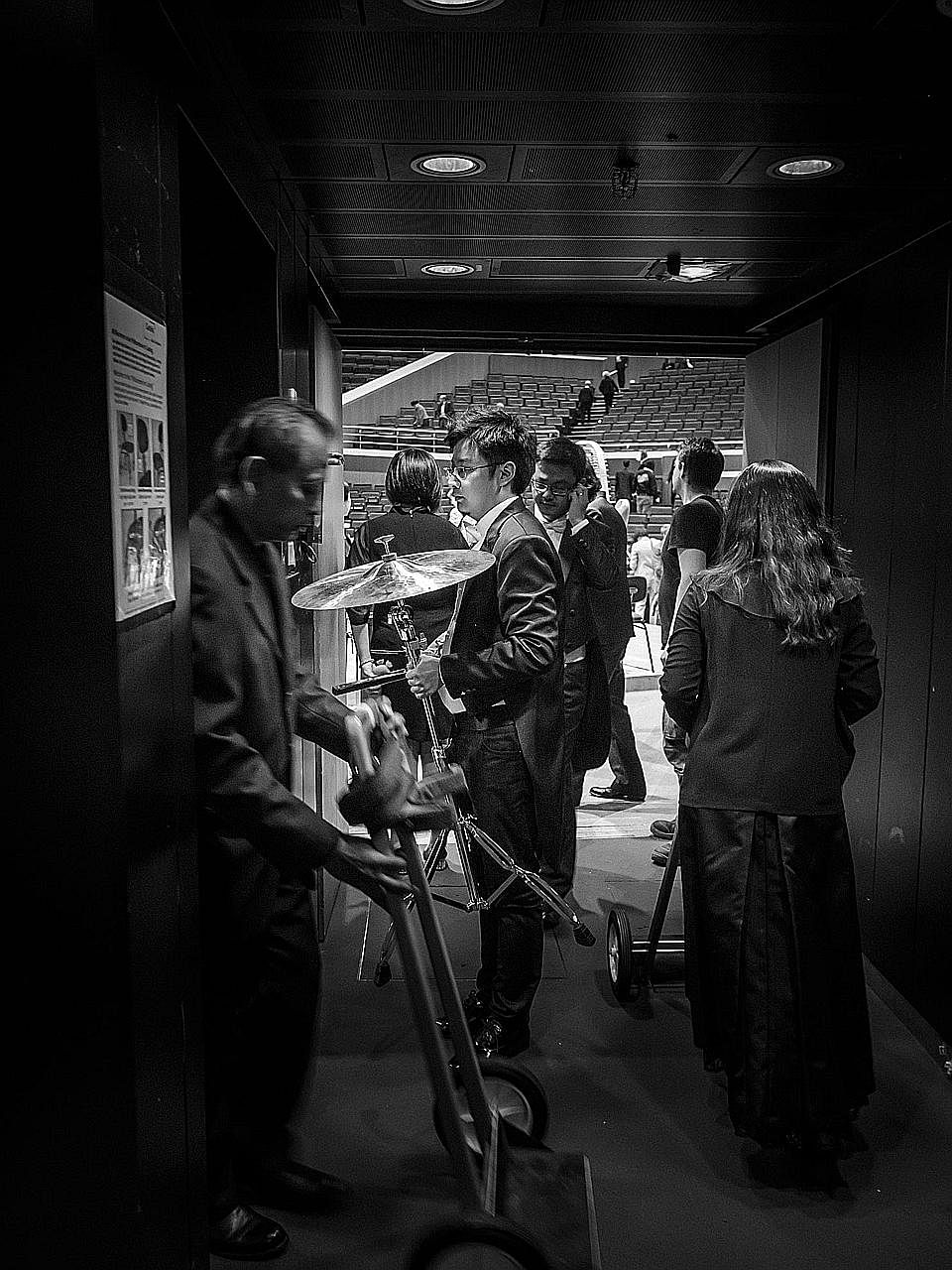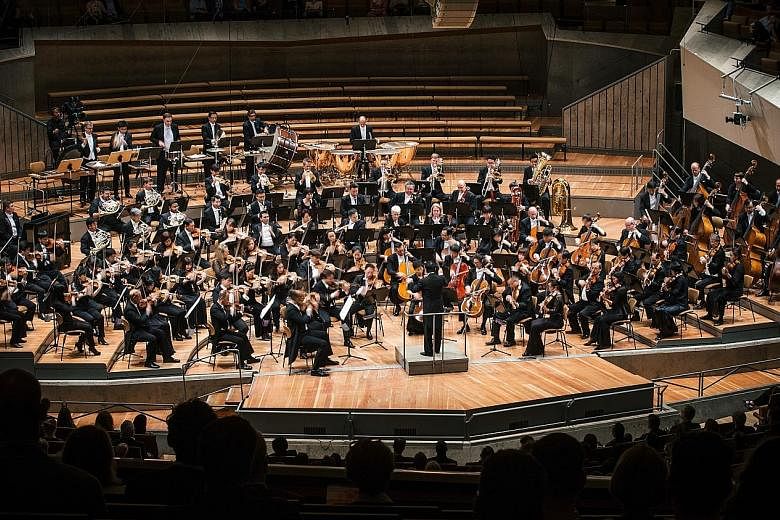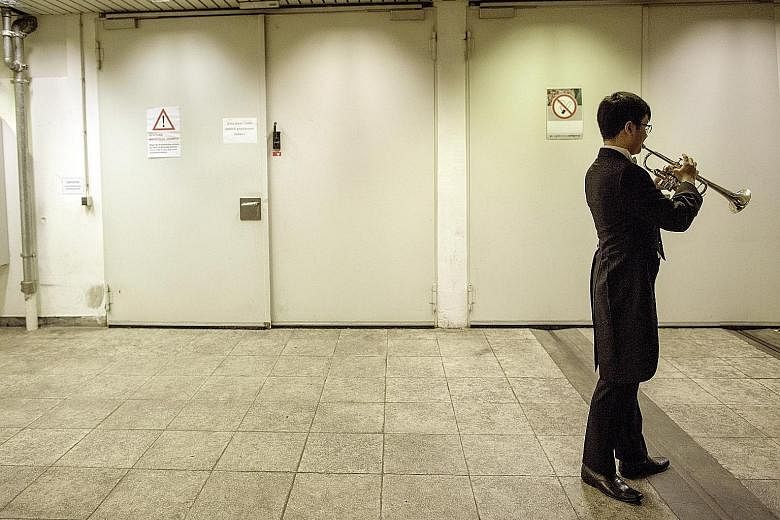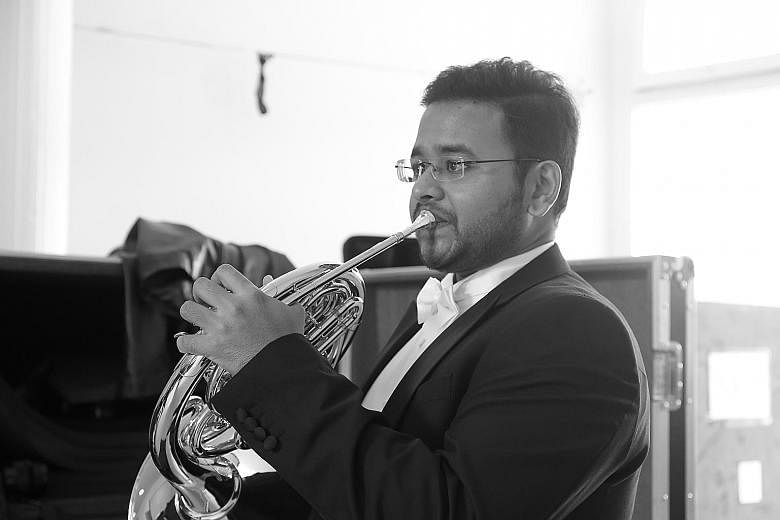On May 23, Mr Kartik Alan Jairamin began warming up on his French horn on the stage of the Berlin Philharmonie, a hallowed concert hall in the world of classical music.
He could barely believe he was there with his fellow musicians of the Singapore Symphony Orchestra (SSO), preparing for the opening concert of the SSO Europe Tour. The road to this stage had taken more than half of his 31 years, in a journey filled with both joy and struggle.
It began in the Springfield Secondary School band where he learnt to play the trombone. It was the first time that Mr Kartik, who comes from a family with no musical background, had been exposed to band and classical music.
Playing in the band allowed his innate musical talent to develop, and at age 15, he won an audition to join the Singapore National Youth Orchestra (SNYO), the country's top youth classical music performance group. The SNYO asked him to learn the French horn, loaned him an instrument, and paid for lessons with SSO associate principal Gao Jian. Playing with the SNYO was life-changing for him. His parents noticed how his love for music grew and what was once a hobby became a deep passion.
That led him to pursue a diploma and bachelor's degree in music performance at the Nanyang Academy of Fine Arts (Nafa), and subsequently complete his master's degree at the Royal College of Music, one of the United Kingdom's top music conservatories. The master's degree was supported by a scholarship from the National Arts Council. Last year, he won an open audition to play in a part-time position with the SSO.
Looking back, Mr Kartik says: "If I had gone through the regular Singapore school system, I would have become just a regular person doing an average job, sitting in the office 8am to 5pm, with little or no aspiration in my life. I guess I would have gotten bored and just job-hopped all my life."

There were two other Singaporean musicians on the Berlin Philharmonie stage with Mr Kartik: his colleagues Zhu Zheng Yi, 28, on percussion, and Lau Wen Rong, 26, on trumpet. They won auditions to enter the SSO last year and this year respectively. Their journeys to the stage too had been a series of unexpected decisions that led to a career in music.
Mr Zhu learnt to play percussion from a young age, by accompanying his father on the erhu, and went on to study at Nafa, followed by the prestigious Royal Danish Academy. Mr Lau started on the trumpet in the brass band of Gongshang Primary School. He later got into the SNYO and trained under professional trumpet players. He landed a place at the Yong Siew Toh Conservatory of Music, followed by winning a place in The Juilliard School to pursue his master's degree.
These talented musicians come from ordinary Singaporean backgrounds, all Housing Board flat dwellers who attended primary and secondary schools near their homes before their talent was unlocked in their youth under the tutelage of professional musicians.
All three attest to the transformative effect that their music experience when they were young had on their lives. They describe the transformation as one of focus. Playing music gives their lives meaning. One says he was not motivated by academic subjects, but playing music kept him interested in going to school. Another talks about how music helped him avoid distractions during his youth, and gave him hope during difficult periods in his life.
They learnt that music could help them cope with their struggles. Their lives changed because they received guidance along the way in an environment that allowed their inner talent to flourish. Guidance is particularly needed to help young musicians overcome the heartbreaks and anxieties that come with the search for musical perfection.
LKY AND SCHOOL BANDS
While some in Singapore have the impression that classical music is accessible mainly or only to society's elite, this is no longer the case. For example, Venezuela's El Sistema programme, which started in 1975, has evolved into a countrywide programme of 400 orchestras, touching the lives of some 700,000 children from poor and lower-income families. The regular orchestra practice helps to keep the children off the street, and at the same time offers those with outstanding talent a platform to become great at what they do. While the tangible results of El Sistema remain contested and controversial, it is generally acknowledged for being sufficiently effective to have spun off a worldwide wave of similar programmes.
El Sistema's most famous graduate is the conductor Gustavo Dudamel, currently music director of the Los Angeles Philharmonic. He will be in Singapore next month to conduct the SSO.
Dudamel's talent was discovered early and led him to the path of conducting. Among his many achievements, he won in 2004 at the age of 23 the Gustav Mahler Conducting Competition, which incidentally this year went to 29-year-old Singaporean Wong Kah Chun, the first Asian winner.
Another well-known graduate is double-bassist Edicson Ruiz, who became the youngest musician to win an audition to a position with the Berlin Philharmonic.
El Sistema is precisely the right name for this programme. It means The System in Spanish, and it is indeed an entire system that puts children through a transformative journey. One could argue that Singapore has a semblance of such a system in place. The far-sighted vision of Singapore's leadership in the 1970s put several elements of this system in place.
First, then Prime Minister Lee Kuan Yew called for the institution of a school band programme in almost all public schools, offering, together with sports, an extra-curricular activity that would develop all-rounded children. By getting children to focus on honing their skills on an instrument and building instincts in making music with others, the band programme could train dedication, perseverance, and, in today's jargon, teamwork.
In 1978, Dr Goh Keng Swee chaired a pro tem committee that formed the SSO to "inculcate a love for music"? in Singapore. This not only created a high-quality music-making group, but also at the same time formed the basis of a community of professional musicians in Singapore that would set high standards as performers and teachers.
The same Cabinet memorandum also re-established the Singapore Youth Orchestra under the Ministry of Education to develop Singapore's best talent, with a hope that they would pursue a professional career and join the SSO in the future. The third policy move in the Cabinet memorandum was the renovation of the Victoria Memorial Hall as the home of the SSO for rehearsals and performances.
In the 1980s through 2000s, the Government supported the set-up of music institutions as avenues for secondary and tertiary-level music training. Through the National Arts Council, the Government supports the funding of classical music groups, as well as individual musicians with exceptional talent. The last element Singapore needs in this ecosystem is wide public support for classical music.
MUSIC IS NOT AN AFTERTHOUGHT
In his September 2016 keynote speech at the National Medal for the Arts award ceremony in Washington DC, Dudamel made an impassioned appeal that the arts not be considered "non-essential", where funding is cut when the economy is slow or when budgets are tight.
Even in Singapore, it can be a default to think of classical music and the arts in general as an afterthought, pursuits that can be afforded only by those for whom core bread-and-butter issues are no longer worries.
It is therefore easy for patrons to think of support for the arts as a dial that can go higher or lower, depending on the economic situation of the day. Fund-raising efforts by arts groups here can sometimes be unpredictable. One arts group over a five-year period reported variation of plus and minus 30 per cent in funds raised from sponsors and donors, with the years during an economic slowdown yielding much lower donations.
Speaking for the classical music sector because this is the area I understand, this way of thinking dilutes the long-lasting social impact that a systemwide classical music arts programme has on a community and a country.
This impact is one of sustained inspiration and purpose. Many elements in the system interact with one another to inspire and uplift a wide group of people, including individual musicians, the community of players, and the audiences that attend the performances.
For individual musicians, a classical music ecosystem provides the platform for individual expression through music, and an environment to grow as a musician in the mastery of an art form.
For the community of players, a rich ecosystem means not only that there are teachers of high standards that can raise the standards of their students, but also that there are sources and moments of inspiration, whether you hear a heartbreaking passage from the SSO, or a jaw-dropping, fast piece mastered by a community orchestra. A community of players also has more chances to play together in chamber groups.
For audiences, there are tangible and intangible ways music can make an impact. Tangible impact includes one's emotional response and awe when listening to the sheer perfection of a craft, such as when a top soloist plays a concerto, or when an orchestra takes you on a musical journey.
More intangibly, the regularity of music performances in a city, both paid and free, helps to set the artistic pulse of the city, bringing a vibrancy to life in that city. Reduction of funding or activity in any one component has ramifications on the balance of the system, and how it achieves its impact on society.
As we move into the second half of our first century as a nation, we also need to further integrate the arts into our lives. We must recognise that the appreciation of, participation in, and support of the arts are an inseparable part of a functioning dynamic economy.
•The writer is chief executive officer of Singapore Symphonia Company Limited, which manages the Singapore Symphony Orchestra and the Singapore National Youth Orchestra.



